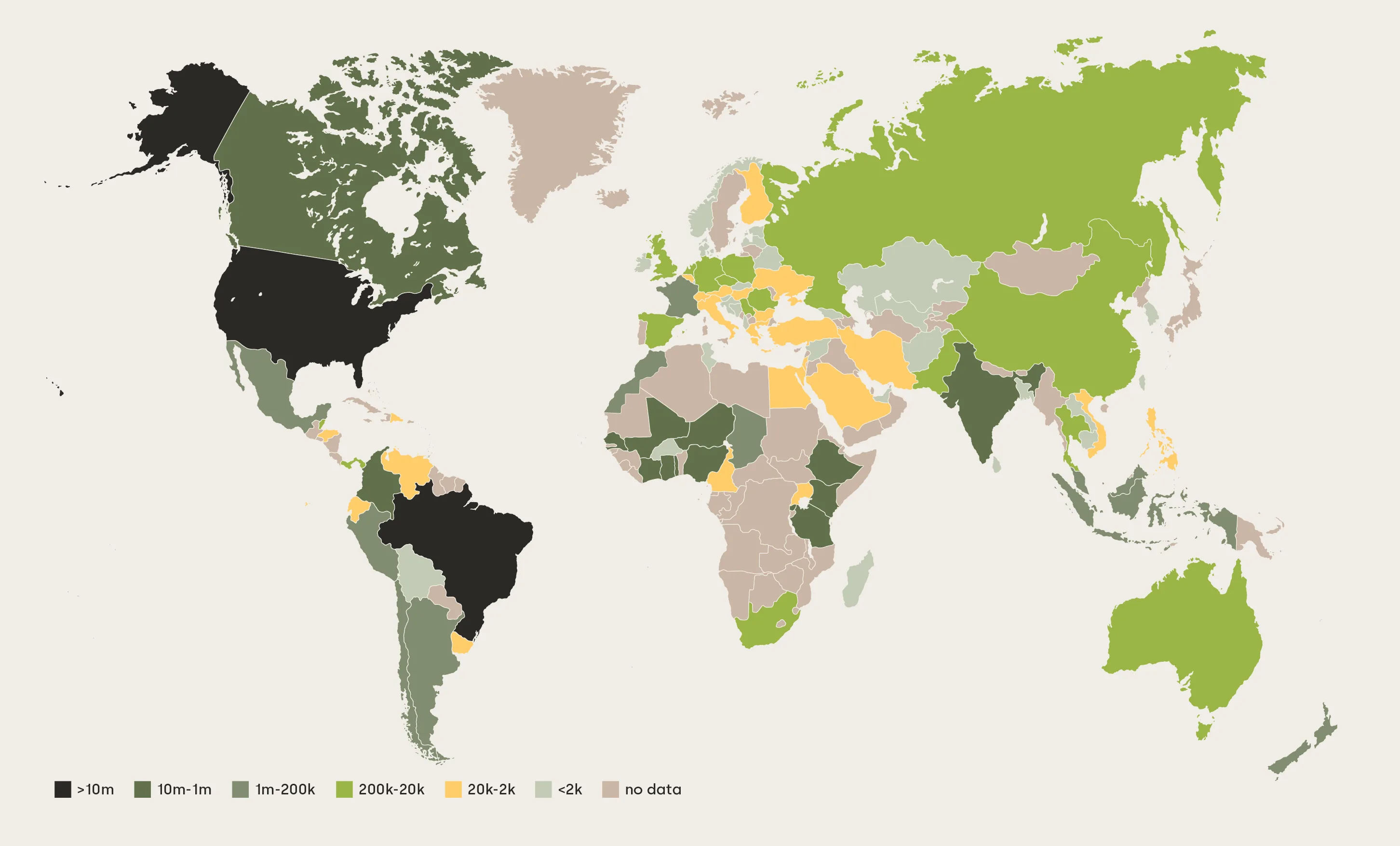

Global food systems are facing significant sustainability challenges that demand prompt and collaborative action
Our current agri-food systems are no longer fit for purpose: they are responsible for nearly one third of global greenhouse gas emissions, account for 70% of global freshwater use, contribute to nature loss and tropical deforestation , and cause soil erosion and depletion. Moreover, 24 out of 35 million smallholders in the world live below the poverty line.
Regenerative agriculture is a critical solution for transforming the way we produce our food for the benefit of climate, nature and people. To stay within 1.5C, we need to triple the land under regenerative agriculture and address the funding gap of $300bn per year required to support farmers on the transition.
Unlocking this potential requires a new paradigm of collaboration. To transform food systems to be regenerative and tackle systemic issues such as deforestation and poverty amongst rural communities, we need to move beyond isolated solutions to an integrated, landscape-scale approach, as stated by Regen10.
A landscape approach focuses on transitioning multiple farms and surrounding ecosystems to regenerative practices, with the entire value chain (farmers, off-takers, financiers) participating, sharing of costs & risks and generating multiple benefits (emissions, soil health, water, biodiversity, farmers livelihoods). Landscape-level partnerships are best suited to drive scale and impact as they are big enough to matter but small enough move quickly, combine benefits for climate, environment & communities, and put farmers' livelihoods at the center.
The COP28 Action Agenda on Regenerative Landscapes is a groundbreaking model of multi-stakeholder action on regenerative agriculture at landscape level. This flagship initiative, launched by the COP28 Presidency, the World Business Council for Sustainable Development (WBCSD), and the Boston Consulting Group (BCG), with support from the UN Climate Change High Level Champions, brings together farmers, agribusinesses, financiers, and leading non-state actors to aggregate, accelerate, and amplify existing efforts and new commitments to transition large agricultural landscapes to regenerative practices by 2030.
The Action Agenda is driving impact by creating the transparency needed to unlock and scale up regenerative landscape efforts
This Action Agenda is working to unlock the transition to regenerative landscapes at scale by ensuring transparency on existing efforts on regenerative agriculture worldwide, connecting key players, and helping catalyse investments in agricultural landscapes. To achieve these goals, the Action Agenda works through four elements:
Stakeholder collaboration: The Action Agenda brings together an ambitious and curated group of participants from across the food & agriculture value chain and beyond, who have committed to investing in regenerative landscapes and measuring impact across five dimensions: carbon, soil health, biodiversity, water, and farmer livelihoods
Data: Participants contribute to a unique global data platform of landscape efforts to facilitate the partnerships needed to reach scale, encompassing 300+ landscape projects across 280m+ hectares and 110 countries
Insights: We have developed a repository of knowledge and experience for tackling roadblocks to systems change in each landscape, including a detailed understanding of farmer economics and needs to help put producers at the center of the agricultural transition. Additionally, we aim to develop a global playbook of replicable and scalable solutions.
Action: We have begun to facilitate place-based programs to accelerate the speed and scale of the transition of large agricultural landscapes and provide a blueprint for global scale-up. The ambition of these Landscape Accelerators is to address the barriers for scale and unlock investments in key high-impact landscapes, by bringing together financial institutions, input providers, consumer-facing companies, agri-traders, producers, and civil society organizations and governments.
As of December 2024, and at the one-year point, the COP28 Action Agenda on Regenerative landscapes has brought together 35+ participants, who have reported investments of 6 billion USD in regenerative agriculture, covering 300+ projects, over 110 countries, 80 commodities, and over 280 million hectares globally.
Furthermore, the Action Agenda, along with key partners, is launching the Landscape Accelerator – Brazil (LAB). Building on existing efforts including the Soft Commodities Forum , The Sustainable Landscapes Partnership, the Forest Investor Club (FIC), and the CGF’s Forest Positive Coalition, along with TNC’s longstanding work in Brazil, Action Agenda partners are joining forces through the LAB to transition the Brazilian Cerrado into the world’s first regenerative biome.
The LAB program brings together financial institutions, input providers, consumer-facing companies, agri-traders, producers, and civil society organizations to accelerate participants’ activities and investments in the Cerrado. By working with local partners, the LAB aims to aggregate and enhance ongoing efforts by identifying common breakpoints and constraints.
We invite agri-food value chain players, local governments, financiers, NGOs, and other stakeholders to join our efforts and contribute to increasing transparency, connecting key stakeholders, and catalyze investments in regenerative landscapes.

Drawing from existing approaches, the COP28 Action Agenda on Regenerative Landscapes has defined regenerative landscapes as inclusive land management approaches that integrate regenerative agriculture, conservation and restoration of ecosystems.
Landscape: socio-ecological system that consists of natural and/or human modified ecosystems, and which is influenced by distinct ecological, historical, economic and socio-cultural processes and activities (TNC, WWF, IDH, EcoAgriculture, The Global Canopy Programme, Achieving sustainable development through integrated landscape management, 2015).
Landscape approach: place-based management approach that involves the collaboration of stakeholders in a landscape to advance shared sustainability goals and build resilience. It aims to reconcile and optimize multiple social, economic and environmental objectives across multiple economic sectors and land uses (CDP, Landscape and Jurisdictional Approaches, 2022).
Jurisdictional approach: type of landscape approach to advance shared sustainability goals where the landscape is defined by administrative boundaries of sub-national or national governments and the approach is implemented with a high level of government involvement (CDP, Landscape and Jurisdictional Approaches, 2022).
Landscape-level initiative: coalition of people and organizations from across sectors and communities who work – over the long-term – toward resilient sustainable development and ecosystem regeneration through a shared landscape vision. (Regen10, Landscape collaboration for regenerative food systems, 2023).
Regenerative landscapes: Drawing from existing approaches, the COP28 Action Agenda on Regenerative Landscapes has defined regenerative landscapes as inclusive land management approaches that integrate regenerative agriculture, conservation and restoration of ecosystems (IDH, Production, Protection & Inclusion ; TNC, Evaluating Regenerative Foodscapes, 2024).
Regenerative agriculture: outcome-based farming approach that generates agricultural products while improving soil health, biodiversity, climate, water resources and supporting farming livelihoods (WBCSD, A shared vision for Regenerative Agriculture, WBCSD, 2024).
CDP and ISEAL’s Guidance on core criteria for mature landscape initiatives: describes the four criteria and their sub-criteria for mature landscape initiatives along with six potential use cases.
Landscale: a tool that supports landscape stakeholders evaluate maturity and impact of landscape initiatives and is aligned with reporting frameworks such as SBTN or CDP’s environmental disclosure framework.
IUCN and FOLU Guide for investments in landscape restoration for sustainable agri-food value chains: supports agri-food businesses make better investments in landscape restoration.
Company roadmap for effective company landscape action and claims: describes the most common operational needs for companies investing in landscapes and provides guidance on how to approach these considerations depending on investment maturity level.
SBTN’s Science-based targets for land: guidance for companies to measure, set targets, and disclose on three agreed-upon land-related targets: halting natural ecosystem conversion, reducing agricultural land footprint, and landscape-scale engagement.
Proforest’s guide to landscape engagement for supply chain companies: guidance on where and how supply chain companies can most effectively engage with landscape initiatives to help meet their commitments.
SBTi’s Forest, Land and Agriculture (FLAG) Guidance: a framework for companies in land-intensive sectors to set science-based targets that include land-based emissions reductions and removals.
Tropical Forest Alliance’s Jurisdictional Action Network: a community of 2,200+ representatives from civil society, the private sector, donors, and development partners interested in advancing the use of landscape and jurisdictional approaches for a forest-positive future.
1000 Landscapes for 1 Billion People: Sustainable Landscape Solutions for People and Planet: a global initiative offering the private sector an opportunity to invest in and partner with landscape initiatives.
Regenerative agriculture outcomes: 11 cross-sectoral outcomes, aligned with key sustainability frameworks, planetary boundaries and UN SDGs, to measure, report, and disclose on regenerative agriculture outcomes for deeper regeneration.
OP2B: regenerative framework specific to regenerative agriculture that was designed to assist the incorporation of regenerative agriculture across company value chains with a focus in carbon, biodiversity, soil health, and water.
Regenerative organic certified: certification for food, textiles and personal care ingredients ensuring that the products meet the highest standards in all 5 key impact areas (carbon, soil health, water, biodiversity, and livelihoods).
Regen10: works to accelerate the transition to regenerative food systems by convening stakeholders across the food value chain, developing shared frameworks and principles for regenerative agriculture, facilitating investments and financial mechanisms, and supporting farmers with tools, knowledge, and resources to implement regenerative practices at scale.

Executive Vice President, Pathways

Senior Director, Agriculture and Food

Director, Agriculture & Food Pathway

Senior Associate, Agriculture & Food Pathway

Managing Director and Partner, Boston Consulting Group

Partner & Associate Director, Boston Consulting Group

Project Leader at Boston Consulting Group